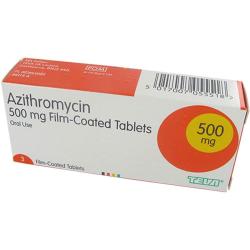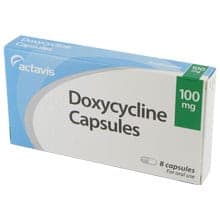Login to your account
- Prescription included
- Genuine medication
- All-inclusive service - No hidden fees
- Free next-day delivery
Non-Specific Urethritis
Get non-specific urethritis medication with an online prescription
Non-specific urethritis (NSU) is a common sexually transmitted infection (STI) in men, though women can also get it. It is mainly caused by other STIs such as chlamydia or gonnorhoea.
It causes irritation and discomfort. Thankfully, it can be treated with a short round of antibiotics such as Doxycycline or Azithromycin.
On this page
What is non-specific urethritis (NSU)? What are the causes of non-specific urethritis? What are the symptoms of non-specific urethritis? What are the complications of non-specific urethritis? How do you treat non-specific urethritis? How do you prevent non-specific urethritis? How do you get treatment for non-specific urethritis?Available Treatment(s)

- Second-line treatment for STIs
- Clears infection in 3 days
- Suitable for chlamydia, NSU and ureaplasma

- Effectively treats bacterial infections
- Fights acne, STIs and more
- Convenient daily dosing
What is non-specific urethritis (NSU)?
Non-specific urethritis (NSU) is a common sexually transmitted infection (STI). It is also called non-gonococcal urethritis when it is not caused by gonorrhoea.
The condition causes inflammation in the urethra. This is the tube that delivers urine out of the body.
It is the most common STI among men. It also occurs in women. However, it is more uncommon and difficult to diagnose in women.
It is spread from person to person through sexual intercourse. This includes anal and oral sex.
What are the causes of non-specific urethritis?
A bacterial infection causes NSU. Usually, it is caused by other STIs.
The most common cause is Chlamydia trachomatis. It causes up to 40% of NSU cases. The second most common cause is Mycoplasma genitalium, which causes up to 20% of cases.
Less common causes of urethritis include Trichomonas vaginalis, herpes simplex, Epstein Barr, and Adenovirus.
The virus or bacteria is then spread from person to person through sexual intercourse. This can be through oral, anal or penile sex. Or, through any sexual contact with a person with the infection. It rarely can be transmitted through sharing used sex toys.
Occasionally, damage to the urethra can cause NSU. The most common reason for this is catheter use.
What are the symptoms of non-specific urethritis?
Urethritis usually causes symptoms. However, not all cases cause symptoms. It is estimated that over 40% of people don’t experience any symptoms. This is why you should get tested regularly for STIs.
Symptoms of urethritis will be different in men and women.
NSU symptoms in men
Men with NSU may experience the following:
- white or cloudy discharge from the penis
- frequent urge to pee
- pain or burning whilst peeing
- irritation and soreness on the tip of the penis
NSU symptoms in women
Women rarely notice symptoms of NSU. Unfortunately, this means that it often goes untreated until the infection becomes more serious.
What are the complications of non-specific urethritis?
NSU can lead to more serious conditions if left untreated.
In men, it can result in epididymitis. This is where the infection spreads to the testicles and causes pain and swelling.
In women, it can cause pelvic inflammatory disease (PID). This occurs when the infection spreads to the womb or fallopian tubes. As women rarely experience symptoms, PID is usually the first sign there was an infection at all.
A more surprising complication of NSU is reactive arthritis. The condition causes pain and swelling in the joints. This happens when the immune system malfunctions when fighting the infection. It instead starts attacking the healthy tissue, which causes symptoms.
How is non-specific urethritis diagnosed?
If you have symptoms, you should go to a sexual health clinic to get tested. Diagnosis of urethritis includes:
- a swab test: a cotton bud takes a sample from the urethra
- a urine test: you are asked to provide a urine sample
You may also be tested for other STIs as well as NSU.
How do you treat non-specific urethritis?
The only way to successfully treat this sexually transmitted infection is by taking a course of antibiotics.
The first-line treatment for an NSU infection is Doxycycline. You take one 100mg capsule twice daily for 7 days.
The second-line treatment is Azithromycin. Patients should only take Azithromycin if they cannot take Doxycycline (e.g. if they’re allergic to it). You take two 500mg tablets for the first day, then one tablet for the next 2 days.
How do you prevent non-specific urethritis?
It is possible to prevent contracting NSU or any STI by practising safe sex.
- Get regularly tested for STIs - especially if you frequently change sexual partners. You can go to a sexual health clinic or get a test kit delivered to your home if you have had unprotected sex.
- Use a female or male condom during anal sex or penile sex.
- Use a dental dam or condom during oral sex.
- Be open about your sexual history with your partner and encourage them to get tested.
- Do not have sex if you have symptoms of NSU or any other STI.
These tips will help prevent catching or spreading STIs.
How do you get treatment for non-specific urethritis?
Once you have a positive result, you can get prescription treatment from your GP. Alternatively, you can order treatment from a trusted online pharmacy.
Make sure you take your treatment exactly as your GP has instructed. If you stop taking it too soon, you may increase the risk of the infection coming back. Over time, it increases the risk of becoming resistant to antibiotics.
- What is non-specific urethritis (NSU)?
- What are the causes of non-specific urethritis?
- What are the symptoms of non-specific urethritis?
- What are the complications of non-specific urethritis?
- How do you treat non-specific urethritis?
- How do you prevent non-specific urethritis?
- How do you get treatment for non-specific urethritis?
Further reading

The Effects of Alcohol on Antibiotics: Complete Safety Guide
Reviewed by Dr. Caroline Fontana
5 foods to eat while on antibiotics
Reviewed by Dr. Caroline Fontana
Burning sensations after sex: causes, treatments and when...
Reviewed by Dr. Caroline Fontana
Select
medicationFill out a short
medical formDoctor issues
prescriptionMedication sent
from pharmacy
